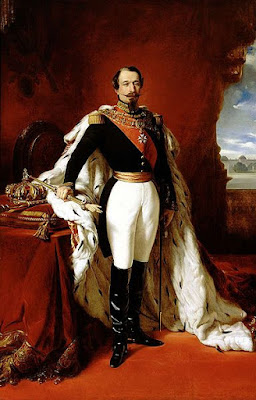This war was motivated by two reasons: 1. The Prussian Chancellor Otto von Bismarck had angered Napoleon III, second emperor of France, who held in usufruct the prestige of Bonapartism. When Bismarck was uniting Prussia, he had to declare war on Austria which was defeated in seven weeks. Napoleon III wanted to take advantage by "being neutral" and asked territories as a compensation. In addition, Napoleon had just failed in his attempt to annex Luxembourg.
 |
Collage of Franco–Prussian War imagery
|
Moreover, in 1868 there was a revolt in Spain, known as "La Gloriosa" that overthrew Queen Elizabeth II. A joint provisional government offered the Spanish throne to Prince Leopold of Hohenzollern-Sigmaringen, belonging to the dynasty that ruled Prussia. Napoleon III was furious! He sent his ambassador Vincent Benedetti to visit King Wilhelm I in order to complain and persuade King Wilhelm not to accept such an offer that would go against France’s interests.
 |
Map of the North German Confederation (red), the
Southern German States (orange) and Alsace-Lorraine (beige).
|
The Prussian king was on vacation in a place called Ems. From there he sent a telegram to his chancellor Bismarck who was in Berlin. Bismarck took advantage of the situation and modified the telegram and dispatched it to Paris. This issue is known as the "Ems telegram, because of the French reaction. Otto von Bismarck planned to provoke Napoleon to attack Prussia in order to call the southern German states to join the North German Confederation led by Prussia. Those states were: Baden, Bavaria, Hesse-Darmstadt, and Württemberg.
 |
| Napoleon III, Emperor of France |
French newspapers demanded war. Napoleon III and his advisers burst of anger incited the French people shouting: "All to Berlin". The Prussian army invaded first the territory of Alsace, on August 4, 1870. Then, Prussians also took Lorena for their resources in coal and iron.
 |
On July 19, 1870, Otto von Bismarck (1815–1898),
architect of German unification, provoked France into declaring war against
Prussia.
|
On September 2, 1870, Napoleon III and 100,000 of its soldiers were taken prisoners by the Prussian army, commanded by General Helmuth von Moltke, at the Battle of Sedan.
 |
Horseback
Combat during the War
|
On January 19, 1871, Wilhelm I of Prussia was crowned Emperor of the Second Reich, in the Hall of Mirrors at the Palace of Versailles. Wilhelm I took the Kaiser title (equivalent to the Roman Caesar and the Russian Czar).
 |
French Emperor Napoleon III (left) as prisoner of
Bismarck (right) in the Franco-Prussian War
|
Wilhem I instead of annexing the whole of France, he helped to form a French republic with Adolphe Thiers as its president. One of the greatest humiliations of history!
 |
Prussian troops marching past the Arc de Triomphe in Paris during the
the Franco-Prussian War, undated illustration.
|
The German Empire was born because the North
German Confederation became part of the new

No hay comentarios:
Publicar un comentario